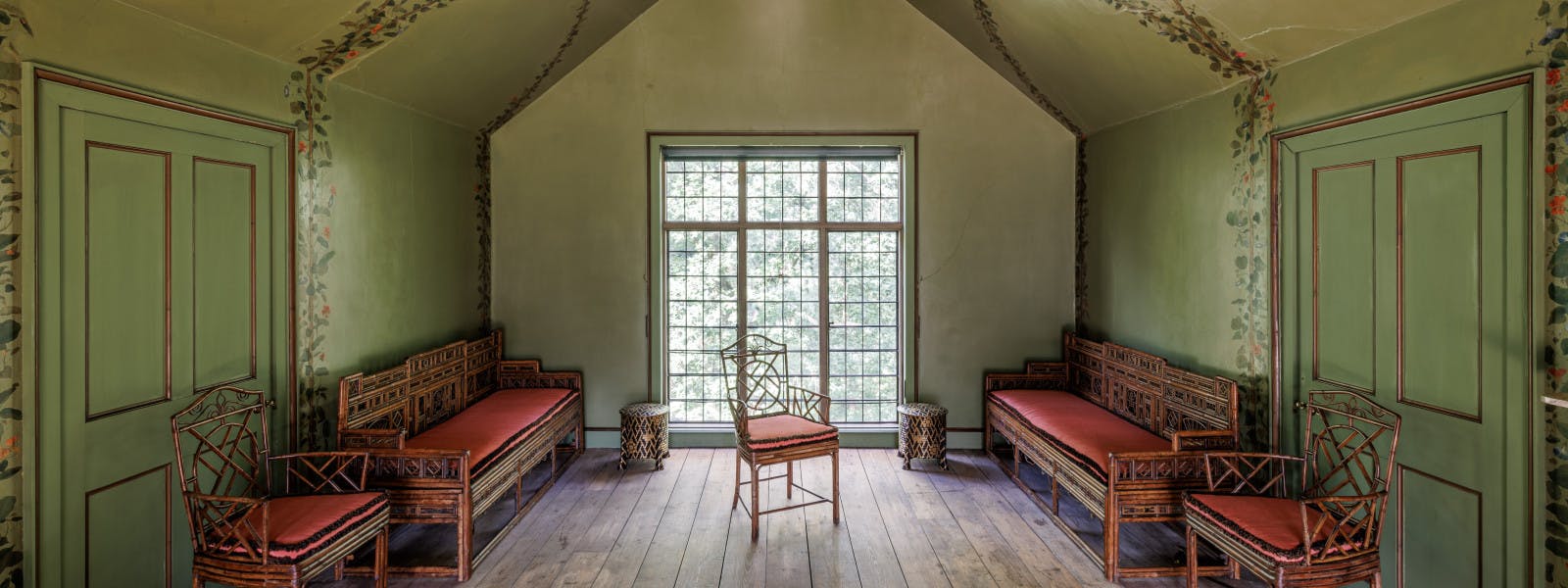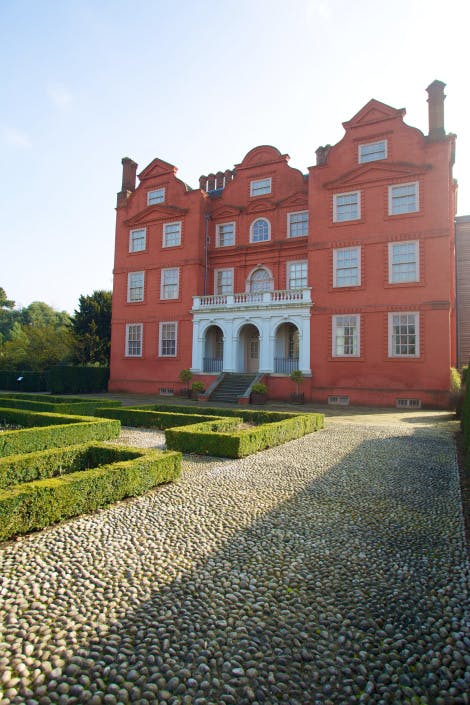
A quiet, intimate hidden gem in Kew Gardens
Skip the event ticket details and go to event summary.
When
Closed for winter
Where
Queen Charlotte's Cottage is tucked away in the south-west end of Kew Gardens.
Ticketing information
Included in Kew Gardens admission
Buy Kew Palace ticketsMake your way down through Kew Gardens and along the riverside to find Queen Charlotte’s Cottage – a secluded retreat used by Queen Charlotte, her husband George III and their family for resting and taking tea during walks in the gardens.
The origins of Kew Gardens can be found in its use as a royal pleasure ground. The Royal Family made Kew their home, including this cottage situated in a secluded part of the gardens known as the wilderness.
Discover an intimate family space

Image: The Print Room. © Historic Royal Palaces
The Print Room
As you explore this ornamental cottage, be sure to watch out for clues as to its royal owners. The most surprising clue might be in the Print Room, which is decorated with two Hogarth sequences named The Harlot’s Progress and The Rake’s Progress respectively. Both sequences were designed as moralising stories, probably for young women, and depict the descent of human nature from a position of innocence and virtue to dissipation and corruption.

Image: Service bells used by the royal family. © Historic Royal Palaces
The Servants' Kitchen
There are also signs of the people who worked ‘below stairs’ to help the royal family make the most of their time here. Service bells used by the royal family to call for their tea can still be seen today, as well as a modest kitchen with a hearth for boiling a kettle. No matter how intimate this space, people worked around the clock to ensure that the King and Queen had everything they required.

Image: The Picnic Room. © Historic Royal Palaces
The Picnic Room
In the Picnic Room, the trellis is believed to have been decorated by Princess Elizabeth, George and Charlotte’s daughter, who was a talented artist. The Princess perhaps painted this in preparation for a tea party for her father, after he had recovered from a bout of illness. Sadly, the party did not go ahead, but the trellis reminds us that this was once a place of happiness and togetherness for George and his family.
The Queen's cottage in the shade of the garden is a pretty retreat: the furniture is all English prints of elegance and humour. The design is said to be Her Majesty's [Queen Charlotte’s].
The earliest description of Queen Charlotte's Cottage, in a London magazine of 1774
A favourite place of George III
While George III regarded the cottage as a 'favourite place', its heyday was brief and George did not return to Kew after 1806.
It was last used by the royal family in 1818 for tea, following the double wedding of George and Charlotte’s sons William, Duke of Clarence (later William IV) and Edward, Duke of Kent in Queen Charlotte's Drawing Room. The latter match led to the birth of a daughter, who would later become Queen Victoria on William’s death.
The cottage was maintained by a housekeeper throughout Victoria's reign, and in 1898 she gave the cottage and its grounds to the public to commemorate her Diamond Jubilee.

The cottage paddock
The cottage began life as a small, modest menagerie keeper’s cottage, and retained this connection as a menagerie throughout the 18th century. Many exotic animals were kept in the cottage paddock. Queen Caroline had kept tigers at Richmond. From the early 1790s, kangaroos (the first to arrive in England) were kept and successfully bred in the paddock – at the time, these animals were described as a '90-pound mouse'.
By the early 19th century there were 18 kangaroos, which made the cottage a popular destination for royal walks until 1806 when Mr Aiton, the gardener, was instructed to turn the kangaroo paddock into a flower garden.
George and Charlotte contented themselves with more docile pets, including cattle and Tartarian pheasants – look out for these colourful birds on your visit!
Explore what's on

- Things to see
Princesses’ Bedrooms
Wander the intimate bedrooms of Princesses Elizabeth, Augusta and Amelia, daughters of George III, at Kew Palace.
-
Closed for winter
- Kew Palace
- Included in Kew Gardens admission

- Things to see
- Tours and talks
The Great Pagoda
See The Great Pagoda at Kew Palace, now returned to its 18th-century splendour.
-
Open on select days from 07 February - 06 March 2026
- 11:00 - 15:30
- Kew Palace
- Separate ticket

- Things to see
The Royal Kitchens
Get an insight into life 'below stairs' at Kew Palace in the Royal Kitchens, preserved as they were in 1818 during the reign of George III.
-
Closed
- Kew Palace
- Included in Kew Gardens admission
Browse more history and stories

Queen Charlotte
Wife of George III and mother to 15 children

George III, the Complex King
Dutiful, intelligent and cultured, but cruelly labelled ‘mad’

The story of Kew Palace
Britain's smallest royal palace and George III's private retreat
Shop online

Shop Kew Palace
Explore our exquisite collection of luxury gifts, souvenirs and homewares inspired by Kew Palace and its rich history.
From £4.50

Royal Palace Fine Bone China Collection
Exclusive to Historic Royal Palaces, this exquisite fine bone china collection is inspired by the beautiful palaces in our care.
From £28

Shop Georgians
Inspired by this time of elegance and enlightenment, our Georgian collection features books, luxury gifts, exquisite jewellery and more.
From £5.00
